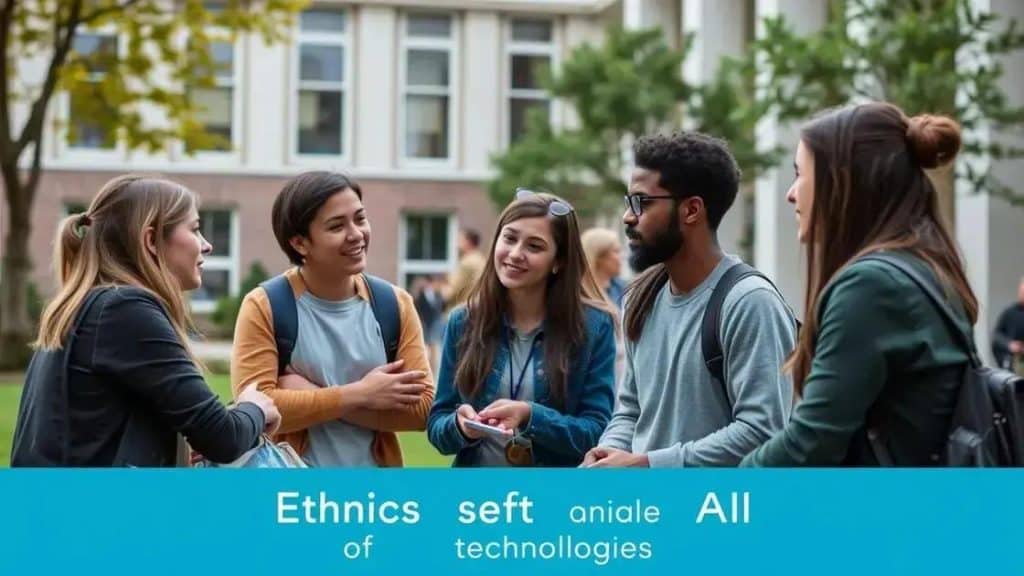AI integration prompts university ethics debates

Anúncios
AI integration prompts university ethics debates by raising questions about data privacy, fairness, and the role of technology in education, requiring collaboration among students, educators, and policymakers for responsible implementation.
AI integration prompts university ethics debates that challenge our understanding of technology in education. As we explore this complex issue, consider how these debates affect learning experiences and ethical considerations.
Anúncios
ethical implications of AI in education
Understanding the ethical implications of AI in education is crucial as technology continues to advance. These implications shape how we perceive the role of artificial intelligence in learning environments.
One significant concern is fairness. AI systems must be designed to ensure equal opportunities for all students. If not, biases can occur, making it vital for developers to prioritize fairness in their algorithms.
Anúncios
Privacy Issues
Another pressing topic is privacy. Educational institutions collect vast amounts of student data, which AI algorithms utilize. Protecting this data is essential. Educational institutions need to establish clear policies on how data is collected, used, and shared.
- AI systems should anonymize student data.
- Clear consent must be obtained from students.
- Regular assessments of data security are necessary.
- Transparency about data usage builds trust.
Additionally, the impact of AI on teacher roles cannot be ignored. AI can assist teachers in personalizing education, but it should never replace the human connection that is crucial in learning. As we integrate technology, we have to remember that the role of the educator is irreplaceable.
Accountability in AI Decisions
Who is responsible for decisions made by AI systems? This question poses a challenge in understanding accountability. Educators and institutions must ensure that clear guidelines are established. This way, if an AI system makes an error, there is a way to address that mistake.
Ethical AI use in education also involves continual reassessment of these technologies. As we learn more about AI and its effects on students and educators, adjustments to our practices will be necessary. Regularly updating AI ethics guidelines is essential to maintain a healthy educational environment.
Ultimately, navigating the ethical implications of AI demands collaboration among educators, technologists, and policymakers. By working together, we can utilize AI responsibly and enhance educational experiences for all.
balancing innovation and integrity

Balancing innovation and integrity is vital in today’s educational landscape. As schools and universities adopt new technologies, it is crucial to ensure that ethical standards are maintained. This balance enhances the learning experience while protecting students’ rights.
Innovation in education can take many forms, from using AI tools to enhance learning outcomes to integrating online platforms for remote education. However, each of these advancements comes with its responsibilities. Stakeholders must evaluate the impacts of technology on students and educators alike.
Ensuring Ethical Standards
One primary concern is ensuring that the innovations align with ethical standards in education. Institutions should implement guidelines for using new technologies. These guidelines can outline acceptable practices and clarify the responsibilities of educators and students.
- Develop clear technology policies.
- Promote transparency in AI decision-making.
- Provide training on ethical tech use.
- Encourage student involvement in discussions about technology.
Moreover, as educational institutions harness innovation, they must remain devoted to the well-being of all students. This approach helps foster an environment where everyone feels valued and safe. Educators must be trained to recognize the potential drawbacks of technology and address them proactively.
Collaboration for Success
Collaborating with tech experts can also aid in finding the right balance. By working together, institutions can develop and implement innovative solutions that prioritize integrity. This cooperation helps identify best practices and potential risks associated with new educational technologies.
Furthermore, schools can host workshops and discussions involving students, teachers, and technology developers to foster awareness. Engaging students in conversations about the implications of technology makes them more informed and responsible users of innovative tools.
Ultimately, balancing innovation and integrity requires ongoing dialogue and collaboration among educators, students, and technology providers. By emphasizing ethical considerations alongside advancements, schools and universities can create a more inclusive and secure educational environment.
role of universities in AI governance
The role of universities in AI governance is becoming increasingly significant as artificial intelligence continues to evolve. Universities serve as critical hubs for research, education, and ethical debates surrounding AI technologies.
By fostering an environment that encourages inquiry, universities can guide the development of AI in ways that align with societal values and ethical standards. This responsibility includes engaging students and faculty in discussions about the implications of AI.
Promoting Ethical Research
One of the primary responsibilities of universities is to promote ethical research in AI. They can achieve this by implementing strict guidelines for AI research projects. These standards help ensure that research benefits society and minimizes potential harm.
- Creating ethics boards to review research proposals.
- Offering training programs on responsible AI use.
- Encouraging interdisciplinary collaboration to enhance ethical perspectives.
- Publishing guidelines that outline best practices for researchers.
Furthermore, universities can play a vital role in shaping public policy related to AI. By collaborating with policymakers, academic institutions can provide valuable insights and data-driven recommendations that reflect their research findings.
Education and Awareness
In addition to research, universities are tasked with educating future leaders about AI governance. Incorporating AI ethics into the curriculum helps students understand the complexities surrounding technology. This education prepares them to make informed decisions in their future careers.
Universities can offer workshops and seminars focused on AI governance. These events can engage students, industry experts, and community stakeholders in discussions about ethical considerations and potential regulations. By fostering public awareness, universities can help demystify AI and encourage informed dialogue.
Ultimately, the active involvement of universities in AI governance helps promote a balanced approach to technology. By prioritizing ethics and accountability, they can contribute to the responsible development of artificial intelligence that benefits all members of society.
student perspectives on AI ethics

Understanding student perspectives on AI ethics is essential as educational institutions incorporate more technology into their learning environments. Students are the primary users of these technologies, and their views can help shape ethical guidelines.
Many students express concern about how AI might affect their privacy. With AI systems analyzing data to personalize learning experiences, students often wonder how their personal information is used. Institutions must address these concerns by promoting transparency about data usage.
Engagement in Ethical Discussions
Students are eager to engage in ethical discussions around AI. They want to know how AI impacts their educational experience and what ethical considerations come with it. By involving students in these conversations, universities can gather valuable insights that reflect their unique experiences.
- Promoting student-led forums about AI ethics.
- Incorporating AI ethics topics into the classroom.
- Creating opportunities for students to voice their concerns.
- Organizing panels with experts to discuss AI implications.
Moreover, students recognize the need for responsible AI development. They believe that universities should prioritize ethical considerations when implementing new technologies. This awareness fosters a culture where technology is used thoughtfully and responsibly.
The Impact on Learning
Students also reflect on the impact of AI on their learning processes. Many appreciate the potential for personalized learning experiences but worry about becoming overly reliant on technology. They emphasize the importance of maintaining a balance between technology and traditional teaching methods.
Feedback from students can guide faculty members to implement changes that enhance educational practices. Engaging with students in evaluating the use of AI allows for adjustments that cater to their needs and preferences.
Ultimately, acknowledging student perspectives on AI ethics enriches the conversation around technology in education. Their insights can lead to more responsible technologies that not only enhance learning but also align with ethical standards.
FAQ – Frequently Asked Questions about AI Ethics in Education
Why is AI ethics important in education?
AI ethics is crucial because it ensures that technology is used responsibly, protecting students’ rights and promoting fairness in learning.
How can students participate in discussions about AI ethics?
Students can engage in discussions by joining forums, attending workshops, and sharing their concerns about how AI impacts their education.
What role do universities play in AI governance?
Universities play a vital role by conducting research, promoting ethical standards, and educating students on responsible AI use.
How do ethical guidelines affect AI development in schools?
Ethical guidelines ensure that AI technologies are designed to benefit all students and mitigate risks associated with data privacy and bias.





